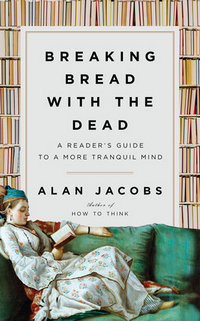 |
Breaking Bread with the Dead: A Reader’s Guide to a More Tranquil Mindby Alan Jacobs Hardcover, 192 pg. Read: September 26-October 15, 2020 |

What’s Breaking Bread with the Dead About?
If I tried to summarize this book (unless I read it 3-4 more times), it would be out-of-control, just me blathering on for 4+ pages. So, let’s have mercy on us all and just appropriate what’s on the publisher’s site:
>From the author of HOW TO THINK and THE PLEASURES OF READING IN AN AGE OF DISTRACTION, a literary guide to engaging with the voices of the past to stay sane in the present
W. H. Auden once wrote that “art is our chief means of breaking bread with the dead.” In his brilliant and compulsively readable new treatise, Breaking Bread with the Dead, Alan Jacobs shows us that engaging with the strange and wonderful writings of the past might help us live less anxiously in the present–and increase what Thomas Pynchon once called our “personal density.”
Today we are battling too much information in a society changing at lightning speed, with algorithms aimed at shaping our every thought–plus a sense that history offers no resources, only impediments to overcome or ignore. The modern solution to our problems is to surround ourselves only with what we know and what brings us instant comfort. Jacobs’s answer is the opposite: to be in conversation with, and challenged by, those from the past who can tell us what we never thought we needed to know.
What can Homer teach us about force? How does Frederick Douglass deal with the massive blind spots of America’s Founding Fathers? And what can we learn from modern authors who engage passionately and profoundly with the past? How can Ursula K. Le Guin show us truths about Virgil’s female characters that Virgil himself could never have seen? In Breaking Bread with the Dead, a gifted scholar draws us into close and sympathetic engagement with texts from across the ages, including the work of Anita Desai, Henrik Ibsen, Jean Rhys, Simone Weil, Edith Wharton, Amitav Ghosh, Claude Lévi-Strauss, Italo Calvino, and many more.
By hearing the voices of the past, we can expand our consciousness, our sympathies, and our wisdom far beyond what our present moment can offer.
So, what did I think about Breaking Bread with the Dead?
Really, what I want to do at this point is to write a series of posts about this book (probably not one per chapter, I could probably combine a couple of chapters together). But really, they’d be the equivalent of those old Chris Farley SNL interviews, “So, you remember X? Yeah…that was cool.”
I’m not saying this book is perfect, but it’s insightful, it’s thought-provoking, and it’s impossible to read without feeling a whole lot more well-read than you are* and (simultaneously) be inspired to read more and more widely. This is essentially true of everything Jacobs writes, I have to admit, so that’s not news. But it’s accurate.
* This is not necessarily true for you, just me.
At the end of the day, you may not agree with every way that Jacobs applies his principles for reading outside your time/culture/perspective, but those principles he enumerates are pretty sound—and at the very least provide a starting point. I think Jacobs is right more than he’s not, and even when I’m not convinced by him, I still find a lot to value.
Get it, chew on it, see if you can apply it yourself.

This post contains an affiliate link. If you purchase from it, I will get a small commission at no additional cost to you. As always, opinions are my own.
![]()




Read Irresponsibly, but please Comment Responsibly